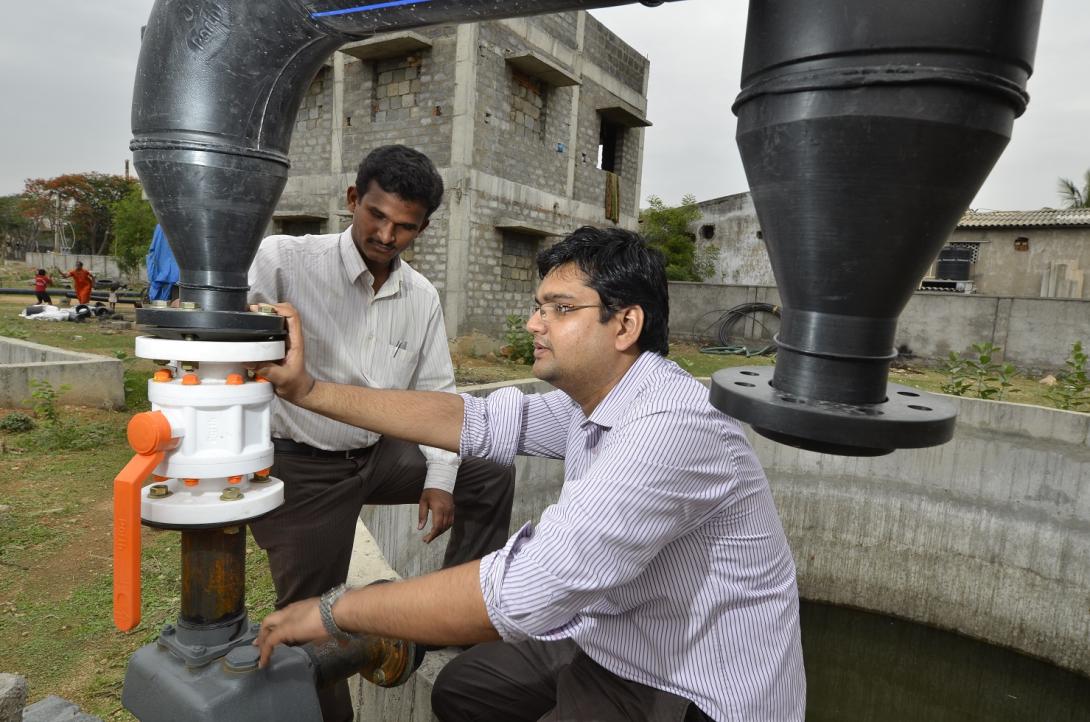Wastewater Management in Industrial Parks

© GIZ, Wastewater Management
Common effluent collection and treatment systems in industrial parks are often either not existing, dysfunctional or not functioning properly in many developing countries. The causes are diverse and must be thoroughly examined from case to case.
The tool includes case studies, best practice examples and management manuals elaborated by GIZ and KfW projects in various Asian countries.
Main features and components
The tool presents experiences from four Asian countries:
India
Under the Water (Prevention and Control of Pollution) Act of India, 1974, every industry must provide adequate treatment of its effluents before disposal, irrespective of whether it is discharged to river, land, sewerage system or sea. The Common Effluent Treatment Plants (CETP) are considered a viable treatment solution for collective treatment of effluents, from small and medium scale industries particularly. CETPs could potentially help in achieving treatment of combined wastewater from various industries at lower unit costs and help facilitating better compliance and monitoring according to standards. However, there are several challenges associated with CETPs. As per a report of the Central Pollution Control Board (2005), less than 7% of CETPs in India is complying with wastewater discharge standards.
The GIZ technical cooperation programme/project IGEP/SEIP supports pilot projects demonstrating financially sustainable solutions for waste water treatment in selected industrial areas through CETPs. The solutions focus on technical, business and management issues for successful operation of CETPs. The pilot activities are focused in the states of Andhra Pradesh, Telangana and Gujarat. The experiences of the pilot examples are documented, and their actual replication is targeted in different industrial areas of different states.
The approach includes comprehensive stakeholder consultations. Capacity building and knowledge management activities are undertaken simultaneously. Finally, solutions demonstrated, and lessons learned shall be incorporated into policies, planning processes and guidelines.
Pakistan
(To be amended in case materials are made available)
Philippines
The Philippine Economic Zone Authority (PEZA) developed a Guideline for Wastewater Management under the cooperation programme “Management Approach to Eco-Industrial Development of Philippine Economic Zones” with GIZ. The guideline provides orientation regarding the relevant laws and regulations and assists management of industrial estates and companies as well as service providers in managing their wastewater.
The Guideline contains general requirements for economic zones and their companies generating wastewater, instructions on managing wastewater, connecting to the CWTF (Centralized Wastewater Treatment Facility), pre-treatment of wastewater, securing wastewater discharge permit, and self-regulation, monitoring and reporting among others. During the project a technical audit of the Sewage Treatment Plant and the Sewerage System was executed to identify reasons for improper functioning. Based on the results and the technology implemented a Standard Manual of Operation was developed and set in force by PEZA with assistance from GIZ.
To establish the required capacities and skills for proper operation some technical training was executed. The main topic was the proper operation of the activated sludge process.
Vietnam
There are around 200 registered industrial zones (IZ) in Vietnam lacking a sustainably functioning waste water concept. This has serious consequences for the environment. The Federal Ministry of Education and Research (BMBF) in cooperation with KfW Entwicklungsbank developed an integrated wastewater management concept for the industrial area Tra Noc in the City of Can Tho in the Mekong Delta.
The integrated wastewater concept ensures the efficient functioning of the integral system with all its components in an economically and ecologically sustainable way. An essential component of the integrated concept is not only the combination of central and decentral technological approaches but also the direct linkage of the technical and the financial planning following fee and cost allocation models that are oriented towards decision-making and apply the ‘user pays’ principle.
Implementation and work steps
The following steps are decisive for the success of activities related to management of waste water:
- Execution of a baseline survey and/or situation analysis to identify the exact problems to be tackled with respect to ‘Industrial Waste Water Management’ (Common Effluent Treatment Plants).
- Based on this, appropriate pilots are planned and implemented to demonstrate and generate knowledge on financially sustainable solutions for CETPs.
- Stakeholder consultations are facilitated through workshops, and information on CETPs is shared and exchanged.
- Policy dialogues are undertaken for development of nationally and locally relevant standards, rules and policies.
- Building knowledge based on CETPs and the development of capacities at various levels underlie all the above-mentioned activities.
- Feedback from the pilot measures and practical experience will be guided into the formulation/review of policy guidelines (standards, rules, policies etc.) at national/state/local level.
Output
- Development of a Guideline for Wastewater Management
- Development of a Standard Manual of Operation for Sewage Treatment Plants
Downloads
Characteristics
Phase of intervention
Designing SIA, Master planning, Retrofitting, Technical infrastructure, Operating SIA, Management
Regions
Asia
Countries
Pakistan, India, Philippines, Vietnam
Target groups
Community representative, Company, SME, Industrial area management and operator, Municipality, Policy makers, Private investors